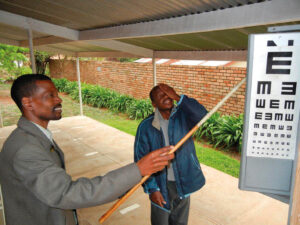Training
Eye for Zambia will help with training local professionals

Postponement of treating eye problems is often the result of a poor
infrastructure and an insufficient number of qualified people. At this
time there is a shortage of eye care professionals in Zambia. Training
the local people, at every level, is the most lasting and structural solution
to ensure eye care for everyone.
43% of Zambians with cataract are unaware that they can be treated

Eye For Zambia’s ultimate goal is to educate Zambians so that they in turn
can educate others Zambians. When one region has a qualified eye
professional, then it won’t take long before there are 2 , then 4 and so
forth. We are aiming for a minimum of 3 people in the examination room-
a teacher, a student and patient. An education can enlarge a person’s
chances which can greatly impact his life. An education provides a job
where a whole family can benefit from. There is enough money to buy food,
and to pay for the children’s schooling,
Eye for Zambia's goal is that the eye clinic would be completely run by local professional Zambians
Eye For Zambia will visit the clinic annually to evaluate and help where necessary
who will be trained?
.Health care professionals: are the most important link between the patient
and the clinic. They inform people, detect eye problems and refer people to the clinic.
Opticians: they determine if glasses would help the person and if necessary
make the glasses
Ophthalmic nurses and optometrists: They can independently treat simple eye
problems and determine if a cataract operation is necessary. They also give valuable
information to people.
Eye doctors and ophthalmological clinical specialists: they can determine what
needs to be done and do it. Treatment could be giving medicine as well as performing
a cataract operation or eye lid surgery.
Low vision specialists: an ophthalmic nurse can lead a rehabilitation program for
people with an untreatable eye condition.